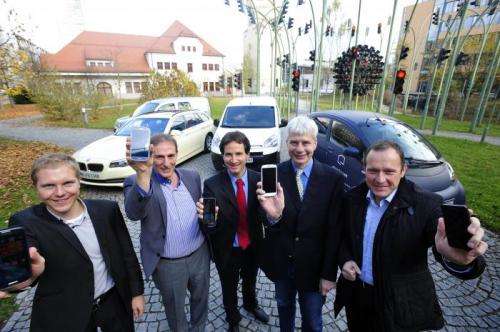Virtual electromobility: Research project simulates electric vehicles

A fleet of 130 virtual electric cars is set to commence on the roads of Munich, Germany. Technische Universitaet Muenchen provides participating companies with smartphones that will be installed in taxis and commercial vehicles to track their movements. The smartphone's software records and processes the driving data to reveal how electric vehicles would perform the corresponding operational cycles in environmental and economic terms.
The last smartphones are currently being handed over to the project participants. Once that has been completed, the first phase of the "Virtual Electromobility among taxis and commercial vehicles in Munich" (VEM) project will begin. This phase entails capturing data on the mobility behavior of the participating drivers.
From the start of next year, the software developed by TUM's Institute of Automotive Technology will simulate the operation of an electric vehicle on each of the smartphones. This is the first time that a simulation of this kind has been undertaken. The phones will record the exact location of the vehicle via GPS, along with driving behavior like acceleration, deceleration and turns. Once this driving data has been collected, the software will calculate the energy consumption for a freely configured electric vehicle and show the charge status of a virtual battery.
An economic alternative
Parallel to the simulation phase, the data calculated will be validated with a real electric car. "This will show various taxi and commercial operators that partial electrification of their fleet would not only be technical feasible, but would already today offer economic and environmental benefits," maintains engineer Benedikt Jäger from TUM's Institute of Automotive Technology.
For the researchers, the biggest challenge lies in establishing the measures needed for electric vehicles to handle the considerable distances driven by taxis and commercial vehicles every day. Electric vehicles have different ranges, depending on their intended purpose. So one of the important findings from the project will be the location of additional charging stations that would need to be installed on taxi and commercial routes.
This information would be of particular interest to the VEM project managers at Munich's urban utilities provider (SWM) and the central Munich transport organization (MVG), as they are in charge of expanding the charging station infrastructure for electric vehicles in the Munich area. Other partners involved in the project include the Munich taxi drivers' association (Taxiverband München e.V.) and the Chamber of Crafts (Handwerkskammer) for Munich and Upper Bavaria. The VEM project is part of the "IKT für Elektromobilität II – Smart Car – Smart Grid – Smart Traffic" electromobility research program sponsored by the German Federal Ministry for the Economy and Technology.
Provided by Technical University Munich




















